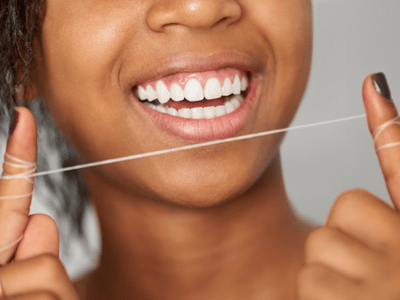
Flossing is just as important as brushing your teeth to prevent gum disease, cavities, and bad breath. It helps eliminate the accumulation of harmful bacteria and plaque resulting from food particles that get trapped between the teeth and under the gum line. These places are hard for a toothbrush to clean, and with braces or appliances, it’s even harder to make sure your mouth is as clean as it should be!
Why is Flossing Important?
As we talked about before, flossing is what eliminates plaque in hard-to-reach places like under the gum line and between teeth. By flossing regularly, you clean these places and help mitigate the risk of cavities, bad breath, and gum disease. It’s just as important as brushing twice a day, especially if you have braces or Invisalign!
Flossing can also lessen your chances of heart disease and long-term tooth decay. Removing plaque and the beginnings of tartar makes sure your teeth stay healthy into adulthood! Daily flossing is a large part of maintaining oral health and removing all plaque.
Flossing with Braces
When you get braces, there are some adjustments you’ll need to make to best keep your mouth healthy. Of course, you’ll have to make dietary changes, but you’ll also have to be extra diligent in your nightly oral health routine. Braces and other orthodontic appliances create more hard-to-reach places for your toothbrush.
All the risks we discussed above become more prevalent, and resulting health conditions can occur. Flossing is your best tool to make sure this doesn’t happen!
How Often Should You Floss?
Generally, dentists and orthodontists recommend that you floss once daily. With braces, there is an increased risk of food getting trapped between teeth or in uncomfortable places. When brushing after meals, it’s important to floss if needed in addition to your nightly flossing. If you’re out and about and can’t floss, you can swish water around your mouth to clean excess food particles, and be sure to floss when you return home.
What is the Best Way to Floss?
There are three general rules to follow when flossing with your braces:
Flossing isn’t as simple as one would think, which is probably why so many people view it as a nuisance and choose to skip it. Fortunately, floss is an inexpensive product, so you don’t need to be conservative with it. Having a generous supply of floss makes it easier for you to use a clean section for each tooth, which is far more hygienic than the alternative.
You don’t want to jam the floss in between each tooth with too much force or vigor. Vigorous flossing won’t produce positive results and will be uncomfortable or painful. Flossing slowly and steadily is the way to go! Make sure the floss is held securely or wrapped around your fingers. Having a firm grip allows you to have the most control over where the floss goes and how much pressure you apply!
These are great tips to follow not only with braces but with Invisalign as well. Good flossing can only be positive, so carrying this habit on after orthodontic care is essential.
Flossing with braces is more difficult than with Invisalign or no orthodontic devices. Luckily, numerous products are available to help you floss more effectively, like floss threaders, orthodontic floss, or a proxy brush. Ask your orthodontist about which tools can help keep your oral health amazing!